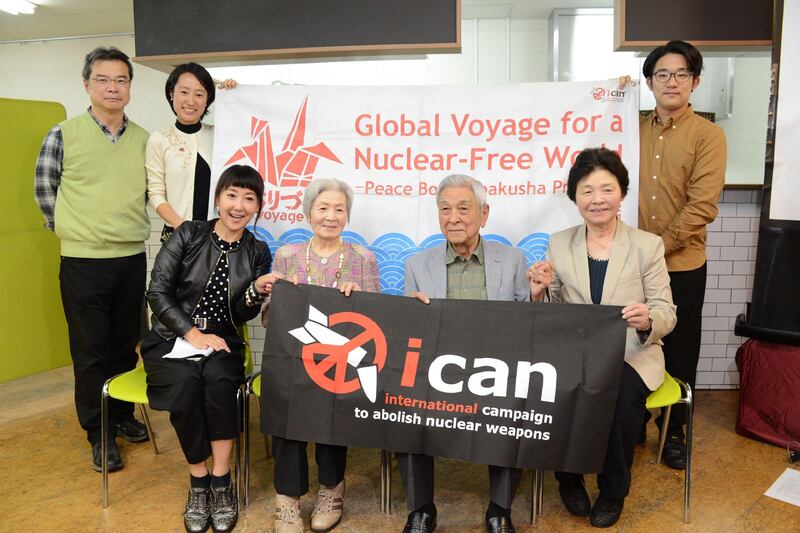Supporters of nuclear disarmament have hailed the decision to award this year’s Nobel Peace Prize to the Geneva-based group ICAN, which has fought for decades to rid the world of the atomic bomb.
The prize "sends a message to all nuclear-armed states and all states that continue to rely on nuclear weapons for security that it is unacceptable behaviour,” said Beatrice Fihn, executive director of the International Campaign to Abolish Nuclear Weapons.
“We will not support it, we will not make excuses for it, we can't threaten to indiscriminately slaughter hundreds of thousands of civilians in the name of security. That's not how you build security," she added.
"We are trying to send very strong signals to all states with nuclear arms, nuclear-armed states - North Korea, US, Russia, China, France, UK, Israel, all of them, India, Pakistan - it is unacceptable to threaten to kill civilians."
_______________
Read more:
[ Anti-nuclear campaign ICAN wins Nobel Peace Prize ]
[ Explainer: Who are the Nobel Peace Prize winners ICAN? ]
_______________
The UAE’s Minister of State for Foreign Affairs, Anwar Gargash, said: "Awarding the Nobel Peace Prize to the campaign on the elimination of nuclear weapons prevented of the Award that some hoped for through a clear preference for the Iranian nuclear agreement.
"In the past, we have seen many cases where the Nobel Committee failed to make the right choice, whereby messengers of peace proved through practice to carry a rhetoric of hate and xenophobia.".
إختيارالحملة الدولية للقضاء على الأسلحة النووية لنوبل للسلام جنّب الجائزة التسيّيس الذي تمناه البعض عبر تفضيلهم للإتفاق النووي الإيراني.
— د. أنور قرقاش (@AnwarGargash) October 6, 2017
The United Nations was quick to praise the news of ICAN’s win.
Speaking to reporters in Geneva, UN spokeswoman Alessandra Vellucci said that the prize was a “good omen” for the ratification of a nuclear ban treaty.
The Secretary General of the UN, Antonio Guterres, also tweeted his congratulations. “Now more than ever we need a world without nuclear weapons,” he said.
Congratulations to ICAN on their Nobel Peace Prize. Now more than ever we need a world without nuclear weapons. #NobelPrize pic.twitter.com/dLDqqZIdoL
— António Guterres (@antonioguterres) October 6, 2017
EU foreign affairs chief Federica Mogherini also congratulated ICAN, tweeting: "We share a strong commitment to achieving the objective of a world free from nuclear weapons."
Good to see the #NobelPrize2017 to @nuclearban. We share a strong commitment to achieving the objective of a world free from nuclear weapons
— Federica Mogherini (@FedericaMog) October 6, 2017
Ms Mogherini had herself been one of the favourites to win this year’s prize for her role in brokering a deal to contain Iran's nuclear program.
Some commentators raised eyebrows at the committee’s decision to award the prize to an international campaign group with a relatively low profile, rather than recognising the Iran deal, a complex agreement hammered out over years of high-stakes diplomacy.
"Norwegian Nobel Committee has its own ways, but the nuclear agreement with Iran achieved something real and would have deserved a prize," tweeted Carl Bildt, a former Swedish prime minister who has held top posts as an international diplomat.
Norwegian Nobel Committee has its own ways, but the nuclear agreement with Iran achieved something real and would have deserved a prize.
— Carl Bildt (@carlbildt) October 6, 2017
The Iran accord, which Mr Trump has repeatedly called "the worst deal ever negotiated," is seen as under particular threat this week. A senior administration official said on Thursday that Mr Trump is expected to decertify Iran's compliance, a step towards potentially unwinding the pact.
_______________
Read more:
[ Trump to ‘decertify’ Iran nuclear deal ]
[ After de-certification, fight over Iran nuclear deal goes to US Congress ]
_______________
However, others welcomed the move as a breakthrough for the global movement that has fought to ban nuclear arms from the day the first atomic bomb was dropped on Japan in August 1945.
Survivors of the Hiroshima and Nagasaki nuclear attacks celebrated the announcement of ICAN’s win.
"I'm delighted that ICAN, which has taken action to abolish nuclear weapons like us, won the Nobel Peace Prize," Sunao Tsuboi, who suffered serious burns in the Hiroshima blast and subsequently developed cancer, said in a statement, according to public broadcaster NHK.
The 92-year-old, who has devoted his life to the fight to abolish nuclear weapons, added: "As long as I live, I hope to work toward a realisation of a world without nuclear weapons with ICAN and many other people."
Mikiso Iwasa, another Hiroshima survivor, said the prize would help push the anti-nuclear movement forward.
“It is wonderful we have this Nobel Peace-Prize winning movement. All of us need to join forces, think hard and walk forward together to turn this momentum into something even bigger,” the 88-year-old told Reuters.
In Britain, the Campaign for Nuclear Disarmament posted a statement that said: “At a time when the prospect of nuclear war seems closer than it has for a generation, the award of this prestigious prize is an essential recognition of the global majority against nuclear weapons - and the movement that has done so much to advance it.”
Nobel peace prize is a big step forward for our movement. #NuclearBan READ https://t.co/IpoEKalKKK pic.twitter.com/5G2XX5nYaJ
— CND (@CNDuk) October 6, 2017
In Russia, there was a more guarded response from President Vladimir Putin's spokesman, who insisted there is "no alternative to nuclear parity" for global security.
"President Vladimir Putin has spoken many times about the importance of nuclear parity, for which there is no alternative from the point of view of global security and stability," Dmitry Peskov told reporters.
He reiterated Russia's "consistent and active position aimed at the non-proliferation of nuclear weapons".
"Russia is a responsible member of the nuclear club," Peskov said, adding that one had to "respect" the decision of the Nobel committee.





